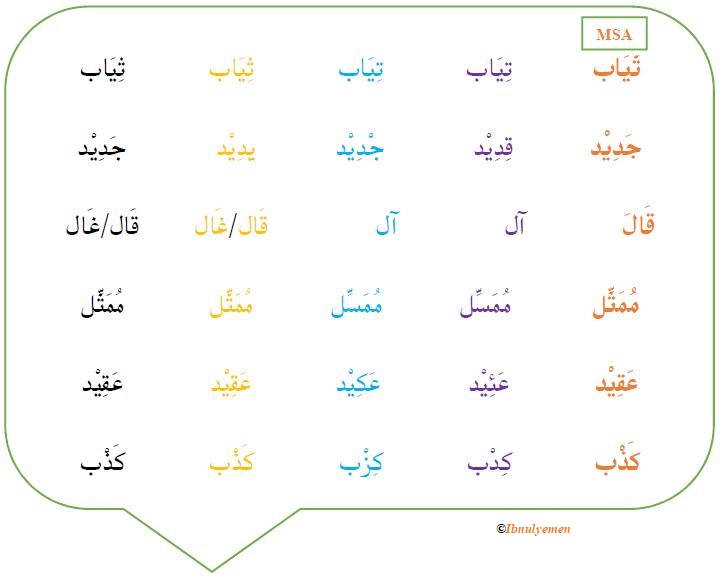MSA and Egyptian Pronunciation Differences [Consonants] Posted by Ibnulyemen اِبْنُ اليَمَن on Aug 24, 2017 in Arabic Language, Pronunciation
Egyptian Arabic (EA) differs from Modern Standard Arabic (MSA) in certain aspects of grammar, word-formation, and pronunciation. Differences in pronunciation can be in producing consonants, vowels, clustering (i.e. how many consonants can occur in a cluster), and stress. For this time round, let’s look at the differences in the pronunciation of consonants.

In listening to a native speaker of Egyptian Arabic, especially Cairene, you must take heed to these MSA sounds: ج ، ق ، ث ، ذ. They are substituted by slightly different sounds, as in the table below:
| MSA sound | Egyptian sound | MSA example | Egyptian example |
| ج | ق | جَمِيل jamiil ‘beautiful’
مَجْدِي maidii ‘Majidi – name’ نَجَّار najjar ‘carpenter’ جَدِيْد jadiid ‘new’ ثَلْج thalj ‘ice/snow’ خَرَج kharaj ‘to go out’ |
قميل gamiil
مقدي magdii نَقَّار naggar قِدِيْد gidiid تَلْق talg خَرَق kharag |
| ث | ت | ثُوْم thuum ‘garlic’
ثَلْج thalj ‘ice/snow’ ثَلاثَة thalaathah ‘three’ |
تُوْم tuum
تَلْق talg تَلاتَة talaatah |
| ث | س | مَثَلاً mathalan ‘for example’
ثَقَافَة thaqaafah ‘culture’ ثَوْرَة thaurah ‘revolution’ |
مَسَلاً masalan
سَقَافَة saqaafah سَوْرَة saurah |
| ذ | ز | ذِرَاع thiraa‘ ‘an arm’
مِذْيَاعَ mithyaa‘ ‘a radio’ نَبِيْذ nabiith ‘wine’ |
ذِرَاع ziraa‘
مِزْيَاع mizyaa‘ نَبِيْز nabiiz |
| ذ | د | ذَهَب dhahab ‘gold’
ذَكَر dhakar ‘male, real man’ ذَاب dhaab ‘to melt’ |
دَهَب dahab
دَكَر dakar دَاب daab |
| ق | ء | قَلْب qalb ‘a heart’
قَالَ qaal ‘to say’ مَقَال maqaal ‘an essay’ |
أَلْب alb
آل aal مَآل maaal |
The ج j in MSA is pronounced as ق or more accurately as the English ‘g’ in game. In foreign words, which are borrowed into Arabic, such as George, John, jam, jacket, the English j is pronounced as in English, thus جُوْرج, جُوْن, جَام, جَاكِت.
As to ث th of MSA, it is either pronounced as ت t or as س s. If the word the contains the sound ث is very common in daily usage, it is almost always pronounced as ت. However, if the word containing the sound ث is less frequent in daily usage, it is mainly pronounced as س. In like manner, ذ is pronounced as د in common words but as ز in less common words.
However, the case of ق is somehow interesting, as it, in a large number of cases, retains its MSA pronunciation. Some examples of these are قَرَار garaar ‘decision’, القَاهِرَة al-gaahirah ‘Cairo’, and رَقَم ragam ‘number’.
This list is not comprehensive. There are other differences that rarely occur in daily communication. In a future post, I will highlight the common morphological (i.e. word-formation-related) differences between MSA and EA.

Build vocabulary, practice pronunciation, and more with Transparent Language Online. Available anytime, anywhere, on any device.




Comments:
SAYAJI SALOKHE:
Hello Sir,
I am 42 years old multilingual person from India. I speak English, Portuguese, French (A2 level) Hindi, Marathi &konkani language.
I wish to learn Arabic language.
Will you guide me ?
Ibnulyemen:
@SAYAJI SALOKHE Hi Sayji,
Language learning is achievable regardless of age, and since you are multilingual you certainly know this pretty well. I believe what one needs, anyone, to learn a new language is to be prepared to put a decent amount of work into it. At the early stages of learning, it like learning any skill, one needs to sit down for long hours to learn the basics of the language. Once learned/acquired, you will then be able to put it into practice conversationally whenever a chance arises. By then, you will also be able to continue learning and augmenting your knowledge of the language on your own.
Here what I suggest you do:
1) Since Arabic uses a completely different scripting system, most of its learners resort to using transliteration (i.e. Romanized Arabic), avoid this completely. This habit hinders one’s learning. Spending up to 50 hours on learning writing system really well is way better than struggling and suffering throughout your learning journey attempting what the correct pronunciation.
2) for (1) to be realized, I suggest you get transparent language online software get the free trial to start with. I am sure you ‘ll enjoy it.
3) learn all the basics in the software units as diligently as possible.
4) check my posts; they are sequenced from the most basic to more advanced topics. This will fit really well with your already acquired knowledge (i.e. learning the basics)
5) be patient as language learning and becoming fluently in a language requires time and effort.
To learn is a feeling of great pleasure so enjoy it!